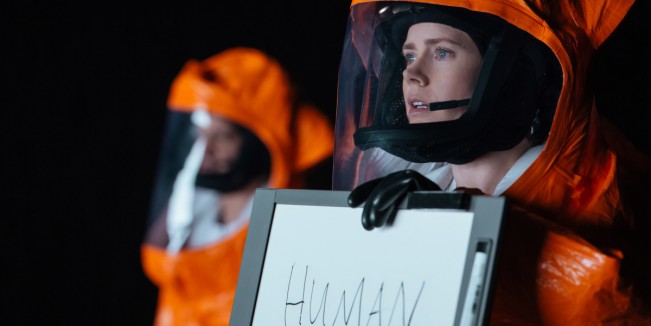By Jake Howell jake.howell@utoronto.ca
Toronto Review: Arrival

Arrival director Denis Villeneuve has realized a beautiful, life-affirming piece of science fiction as visually strong as it is thematically layered, featuring astonishing performances and knockout sound design to carry it through the upcoming season. Any qualms about the Québécois-turned-international director’s Blade Runner sequel can be dismissed.
 Adapted from Ted Chiang’s Nebula-winning novella “Story of Your Life,” Villeneuve’s eighth fiction feature showcases Amy Adams as Louise Banks, a linguist whose skills may be able to interpret alien communications from one of twelve massive “shells” that have arrived on Earth. Working with the U.S. Army and the gruff Colonel Weber (Forest Whitaker), Louise enters the shell with mathematician Ian Donnelly (Jeremy Renner), determined to learn more from “Abbott” and “Costello,” a pair of Lovecraftian giants that communicate through coffee-stain rings of ghostly ink.
Adapted from Ted Chiang’s Nebula-winning novella “Story of Your Life,” Villeneuve’s eighth fiction feature showcases Amy Adams as Louise Banks, a linguist whose skills may be able to interpret alien communications from one of twelve massive “shells” that have arrived on Earth. Working with the U.S. Army and the gruff Colonel Weber (Forest Whitaker), Louise enters the shell with mathematician Ian Donnelly (Jeremy Renner), determined to learn more from “Abbott” and “Costello,” a pair of Lovecraftian giants that communicate through coffee-stain rings of ghostly ink.
As these two intelligent races peacefully exchange information — and through Amy Adams’ shining performance, this process is a marvel to behold — the manifestations of human nature and applications of linguistic relativity fester: political climates upend, stock markets crash and global superpowers itch to engage violently. In short: no one is cooperating, making human-to-human dialogue as xenophobic as the arrival of extraterrestrials.
Like so many aspects of this movie (and to be specific, Amy Adams in particular), these aliens and their floating shells — which look like immense “contact” lenses — are graceful, silent monoliths. Were this a Christopher Nolan film, the spaceships (and earthbound forces) would hum with bowel-rattling bass vibrations, but that now-cliched shorthand gimmick to inspire awe is absent.
On the contrary, Arrival is too elegant, too smart, too well-acted to be a product of Hollywood excess — or perhaps more disappointing than that, merely sci-fi prestige. Rather, with Arrival, Villeneuve finds majesty in simplicity. His film is nearly an IKEA catalogue in its set design and composure. Arrival dips into Tree of Life territory when we see flashes of Louise’s mind, but unlike other directors who employ similar shots of handheld wonder, Villeneuve restrains his indulgences. Put simply, this is one of the best movies of the year; it heralds a director who is prepared to make movies magical again and again.













